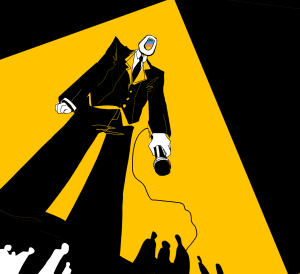Developer: Cardboard Computer
Platform: Windows, Mac.
Price: $7 (Act I), $25 (Act I-V)
Some games fit nicely into square little boxes. They’re easy to describe, even easier to grasp, and disappear from the mind just as quickly as they come. There’s no mystery, nothing compelling that sticks in the mind for days afterwards. “Kentucky Route Zero” is anything but one of these games.
Ostensibly, the game is about a delivery driver for a small antiques store. Named Conway, he is tasked with tramping through rural Kentucky in a beat-up truck to make a delivery to an address that doesn’t exist, at least not in any familiar world. To get to said address, he must find a secret, and possibly mythical, highway: Kentucky Route Zero.
In the simplest sense, “Kentucky Route Zero” is a side scrolling adventure game, complete with all the trappings therein. What sets this game apart from others in its genre, however, is the inclusion of what can only be described as partial three-dimensional space. The simple vector artwork stands out through the manipulation of the player’s perspective, sometimes giving the impression of three dimensional space, other times shifting to somewhere in between flat and 3D.
Adding to the air of minimalism is an impressively well-conceived set of art assets. Though the set pieces are fairly sparse, they flesh out the environment in an engrossing way and are extremely pleasing from an aesthetic point of view. Shadows are defined in an almost noir sensibility, and an air of mystery and discovery hangs over every locale.
Location is indeed important in this game, perhaps more than anything else. The story and characters are intentionally vague, lost in the perfectly presented Kentucky night. Crickets chirp, engines hum, and footsteps clack. But beyond simply assigning sound effects, this game seems to present sound as the primary storyteller. Given the minimal nature of the art style, every sound takes on an entirely different meaning. The soundtrack itself, which consists of actual music only at key moments, seems to be focused on creating a profoundly enveloping sense of place. The sounds of bluegrass played by a phantom band on a hillside, or of a scratchy tape recorder playing choir music in an empty church, are what take this game into the realm of experience. They strip away the player’s pre-conditioned attempt to construct a narrative, with concrete characters and clear events, and drop them lightly down into a cushiony space where discovery is both welcome and terrifying.
For players that are accustomed to traditional RPGs and adventure games, Kentucky Route Zero is something of a frustrating revelation. The game uses a fairly common trope, the speech bubble, to communicate dialogue, story, and player choices.
But beyond that, “Kentucky Route Zero” seems to actively mock player choice. Despite what path the player seems to choose, the outcome is always the same, and the narrative unchanged. At first it’s annoying, but after a while the player’s lack of definite decision-making ability becomes something of a constant companion. The assumption that the player makes with other games, that their decision is gospel, suddenly seems almost childish as the game proceeds. It proceeds without them, pushed forward by a force unseen. The player is no longer the determiner of his or her own destiny, or even the driver of the game’s action.
A review of Kentucky Route Zero, of course, invites a comparison with “The Walking Dead,” a series that emphasizes player choice to almost absurd levels. In “The Walking Dead,” the decisions that the player makes have extreme consequences and place them as the primary motivator of the game’s action. Despite the minimization of traditional game mechanics in favor of storytelling in both games, Kentucky Route Zero seems to be mocking the emphasis on player choice. At least in Act I, the player’s choices really don’t matter in the overall scheme of things, putting an emphasis instead on environmental experience as the primary way of telling a story. This is, in a way, a criticism of “The Walking Dead,” perhaps suggesting that the player should not always be the ultimate decider of their destiny.
If the critical reception of “The Walking Dead” is any indication, video-game writing is still in its infancy. Truly, the “innovations” found in “The Walking Dead” are comparable to anything a casual viewer could pick up on a mediocre network television series every day. Which makes Kentucky Route Zero even more important. Despite having nowhere near the audience or scope of “The Walking Dead,” it has managed to put forth a work that is experiential, story-based, and something akin to a meta-game (at least in its current form).
Kentucky Route Zero successfully creates an atmosphere and environment that is altogether entrancing and worthy of a play through. Act I is a resounding success, and the game’s meta-critical aspect makes it all the more excellent. I have hope for the upcoming chapters, and if Cardboard Computer stays in the same vein, they’re bound to be worthy of praise.
The game is episodic in nature, with seven scenes making up the first act. Currently, there’s only one act available, but there are more to come throughout the year for an eventual total of five. Just the first act costs $7, while the entire game (with all subsequent additional chapters) can be purchased for $25. It’s worth every cent.
Kentucky Route Zero was reviewed on a Macbook Pro w/ Retina Display, 2.6 Ghz i7, 8GB DDR3, Intel HD 4000 512Mb.















